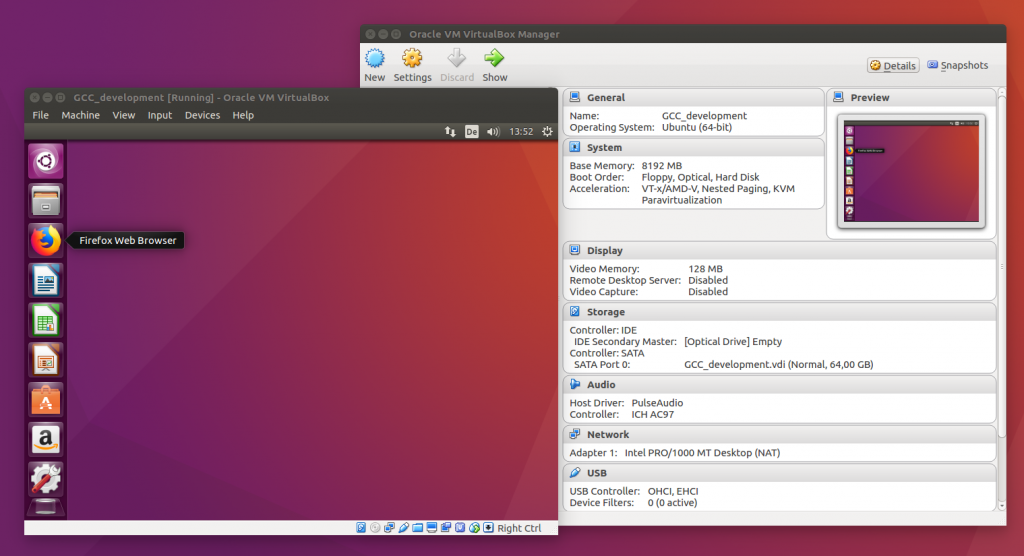
- #Virtualbox linux 64 bit not available mac os
- #Virtualbox linux 64 bit not available install
- #Virtualbox linux 64 bit not available 64 Bit
- #Virtualbox linux 64 bit not available pro
It turns out, upgrading my hard drive wasn’t even remotely causally related to my problem. The video shows the installation Steps for Oracle VirtualBox.In the next step, it shows the two possible fixes if VirtualBox only showing 32-bit guest OS ver.
#Virtualbox linux 64 bit not available 64 Bit
The guest VM still does not recognize the Android device and abd doesn't list any when I issue the adb devices command.Īny help here would be greatly appreciated. virtualbox 64 bit linux not available 32 bit If VirtualBox is only showing 32 bit versions in the Version list make sure: I think I literally pumped my fists in the air when I saw this screen. create les with the appropriate SUBSYSTEM, ATTR and MODE values set.

#Virtualbox linux 64 bit not available pro
Add filter for Motorola device (VendorID = 22b8) and set Remote option to "Any" My virtual machine of 64-bit Debian 7.5 (wheezy) was working in VirtualBox 4.3.12r93733 on a Windows 8.1 Pro (64-bit Operating System, 圆4-based processor: Intel(R) Xeon(R) CPU E5-1620 v2 3.70GHz 3.69 GHz) machine (Dell Precision T3610) yesterday.Most commonly it is a BIOS setting to be turned on before any 64bit virtualisation is possible. Edit VM settings to enable USB Controller AND USB 2.0 (EHCI) Controller. Answer (1 of 4): If your machine supports it and the host OS also does the same. Description:For many of us when we start using VirtualBox, we face problems where either the virtualbox is throwing error, or the 64-bit option is not missin.Run "VboxManage list usbhost" to confirm that the device is being recognized by VBox and listed as "Available".Plug in Android device via USB and allow Windows to recognize it.Note that I've already uninstalled VirtualBox, reinstalled the latest version, installed the VirtualBox Guest Additions as well as the latest expansion pack Hardware virtualization is enabled in the BIOS. USB device 'motorola XT926' with UUID is busy with a previous request. If VirtualBox is only showing 32-bit versions in the Version list make sure. I've followed numerous guides and forums in order to have my VBox guest recognize my physical Android device via USB, but I keep getting the following error pop-up: Failed to attach the USB device motorola XT926 to the virtual machine Android.
#Virtualbox linux 64 bit not available mac os
Perhaps the VBox.log will explain why VirtualBox display the 32bit versions of all displayed OS. VirtualBox is a multi platform and open-source virtualization tool for Windows, Linux, Mac OS X, and other operating systems, that lets you create virtual. Also in step 5 there was no deactivate disk option, so I just resized the disk and it worked like. VirtualBox for Linux (64-bit) is a cross-platform virtualization application. Model name : Intel(R) Pentium(R) 4 CPU 3.I've setup an Ubuntu 12.04 LTS 64-bit VirtualBox guest running on a Windows 7 host (also 64-bit) with the sole purpose of Android-based hacking, programming, debugging, etc. Since I have a 64 bit OS, a 64bit version of VirtualBox, and a 64 bit version of Centos, it would naturally fail when VirtualBox states 32 bit Linux when creating the virtual machine. I can also confirm, step 6 not required for Ubuntu 18.04.


Model name : Intel(R) Pentium(R) 4 CPU 3.00GHzįlags : fpu vme de pse tsc msr pae mce cx8 apic sep mtrr pge mca cmov pat pse36 clflush dts acpi mmx fxsr sse sse2 ss ht tm pbe syscall nx lm constant_tsc pebs bts nopl pni monitor ds_cpl est cid cx16 xtprĪddress sizes : 36 bits physical, 48 bits virtual
#Virtualbox linux 64 bit not available install
When attempting to install a new OpenSuSE 11.1 x86_64 guest, the installation stops with the "Cool Software but." dialog telling me "This is a 32-bit computer. The 64-bit version options should now be available as shown in the following screenshot. lscpu OR lscpu grep Virtualization Check Virtualization in Linux Next, launch VirtualBox and try to install a new guest OS. Just cleanly installed 3.0.6 r52128 on an OpenSuSE 11.1 x86_64 host. After a reboot, log in to confirm that CPU virtualization support is now enabled, check your CPU settings using the lscpu command.


 0 kommentar(er)
0 kommentar(er)
